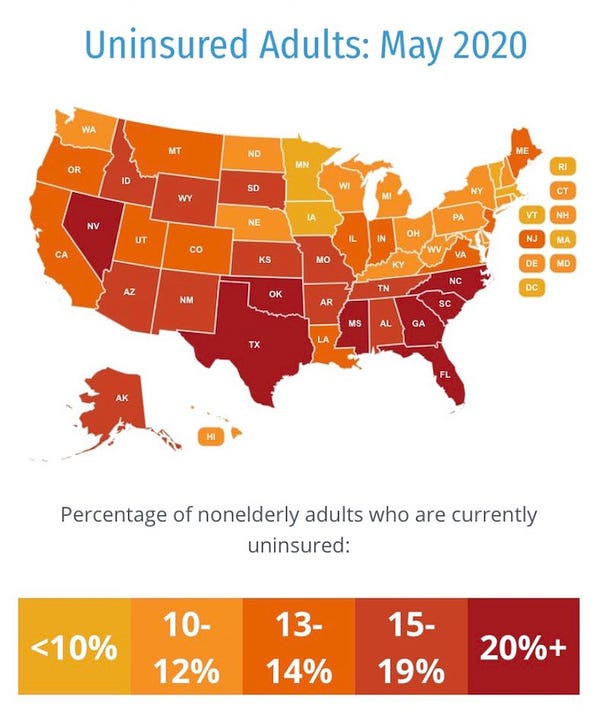Turns Out You Couldn't Keep It
Pete Buttigieg and Joe Biden poisoned the well for single-payer healthcare at the worst possible time.

On Monday, the New York Times reported on a new study that found that 5.4 million Americans lost their health insurance coverage between February and May, a larger number than has ever lost coverage in any full year in history.
According to the study, from the group Families U.S.A., more people than the entire population of South Carolina lost their insurance because they lost their jobs. If only there was a way to decouple healthcare coverage from employment; if only we had spent the last five years talking about how exactly to do that.
There is no shortage of people at fault for this, and it’s tempting to pin it all on Republicans at all levels, from the Supreme Court to Congress to the state legislatures which to this day refuse to expand Medicaid. Even if you concede that policymakers couldn’t have predicted the coronavirus or how quickly it would turn the economy on its head, they have all ostensibly been alive for the past 15 years and can remember the last time we had an economic catastrophe which resulted in millions of people losing their jobs. The losses have also been felt harder in states which haven’t expanded Medicaid (where 43 percent of laid-off workers became uninsured, according to the study) versus those which have expanded Medicaid (where 23 percent of laid-off workers became uninsured).
But at this particular moment, in an election year which could easily yield a tsunami of support for the Democrats, Joe Biden’s plan for those who got kicked off their insurance and those who had inadequate coverage even before we were plunged into the Coronavirus Depression is just more of the same bullshit: “access” to “affordable” care, which is both inaccessible and unaffordable when you don’t have a job and your unemployment is set to expire at the end of the month—if you’ve been lucky enough to get it at all, that is.
The anti-Medicare for All line pushed most prominently by Pete Buttigieg, Biden, and a plethora of for-profit companies in the business of healthcare was that Americans didn’t want free healthcare on-demand. Instead, they wanted choice; in particular, the choice to keep their existing health insurance plan instead of a plan that did all of the same things and was still free. Now, at least five and a half million of them no longer have that choice.
Buttigieg perhaps played the biggest role in poisoning the well for Medicare for All, since Biden faded into the background during much of the primary season. The Buttigieg campaign started running the above ad in September, aiming it mostly at then-frontrunner Elizabeth Warren. Warren, who was always more comfortable explaining how to reduce inequality through regulatory schemes rather than expansions of the safety net, fumbled the bag when pressed hard enough on her plan and how quickly it would get us to full coverage, which opened the left lane wide open for Bernie Sanders, who has been campaigning on single-payer for thirty years.
It was clear from exit polling in every single state that, at least among the Democratic electorate, Sanders succeeded in winning the ideological battle over his biggest and most longstanding policy goal: creating a single-payer healthcare system in the United States and drastically reducing, if not outright eliminating, the role of private insurance companies in the healthcare system.
But Buttigieg did not just run against Medicare for All as being pie-in-the-sky and unattainable in our present political system. He ran against it as “divisive,” as actively harmful to the country and antithetical to the concept of freedom itself—as if the concept of never having to deal with a premium increase or out-of-network cost or surprise bill again was akin to being thrown into a gulag.
Considering the main obstacle Sanders faced was reassuring Democrats that he wasn’t too far out of the mainstream in the first place, being accused by people in his own party of wanting to destabilize the entire country did him zero favors, and undoubtedly helped convince primary voters that they needed to set aside their own policy preferences in favor of Joe Biden’s “safer” status quo solutions. (In a just world, such a loogie spat directly in the face of the working class at the worst possible time would doom Buttigieg’s career in politics. In the world we’ve got, we’re going to have to listen to this guy and his Midwestern Values horseshit for the next four decades.)
The response to Buttigieg’s smears was obvious: No American has true freedom of choice in healthcare. If you’re lucky enough to have a job that offers insurance in the first place (or have the money to spend hundreds per month on a marketplace plan), you’re relegated to the plan your job is willing to pay for, and bound to the job to keep your crappy plan because it’s better than switching jobs and waiting one to three months for your new coverage to kick in.
And now, in the first real economic catastrophe since the passage of the ACA, more than five million people have lost that freedom of choice entirely. (That number is almost certainly higher, given that a net of tens of millions of people have lost their jobs since the crisis began.) And given that we’re just starting to discover the long-term health impacts on those who survive the virus, it’s reasonable to say that the cost of healthcare is going to become a larger and more pressing issue over the next few years and beyond. Medicare for All won’t prevent people from getting the virus in the first place, but it does provide a necessary shield against economic ruin.
Though the campaign is over and Medicare for All has all but ceased to receive any kind of media attention as Sanders has taken on more of a supporting role for Biden (for instance, it goes completely unmentioned in Monday’s Times story), the proposal is still clearly fresh on the minds of voters. Its support spiked between February and March when the full scope of the pandemic first took shape in America, and by all accounts, support for a national health insurance system remains popular. This is no small feat when you consider that both major-party presidential candidates forcefully oppose Medicare for All, even as Biden has gestured to his left in hopes of placating Sanders’ primary voters.
Our sham of a health insurance system is being exposed for its structural rot, and it’s time to let it die and create something better. Luckily for Biden, he’s still got about four months or so to embrace the one plan that’ll stabilize American health insurance long-term, regardless of what ailments the world throws at it. Your move, Joe.
Screenshot: Pete Buttigieg/YouTube







Biden never will, and it's going to be awesome to see Buttigieg on The View explaining how employer-sponsored health insurance simply needs a stimulus directly to insurance companies to be able to keep covering furloughed and temporarily laid-off employees. Same as it ever was.
Hi Paul, Ryan here. We're friends through music, definitely been on the same email list before, have 26 mutual Facebook friends, etc, haha. I'm about 85% sure we've met at Fest and such before, want to say at like Timeshares or Signals Midwest or something, but I would never rely on my Fest memory (it was indoors, and it was hot). Never actually read your writing before or visited Splinter, but thought I'd toss some money towards this blog after reading the about page. Good luck with the endeavor!
Healthcare is so bizarre in this country. I've had probably 5-7 different private plans over the past 15 years, mostly through employers, but have also purchased in the market place before, which was a generally awful experience of paying more for less coverage. Nothing has consumed more of my disposable income over the years than healthcare, no doubt, even on what you'd consider a good plan. I do have a couple chronic health issues and I think this year will be the first year I don't hit my out of pocket max in the past 4-5 years, which even on my best plan would be at least $6500 out of pocket per year. In practical terms, including medications, copays, and premiums the number is probably closer to $10k.
Really, I feel fortunate though. I work in IT and can generally land the types of jobs where I can afford those bills. It's definitely not lost on me that $10k/year in medical expenses is more than most people can probably afford, and I know that even being able to afford those costs still serves as a significant stressor in life.
I had some contract work supporting Center for Medicare and Medicaid (CMS), particularly the innovation center that was created as part of the ACA. I didn't stay long. I've worked at a variety of organizations: big investment firm, humanitarian aid/international development nonprofit, environmental advocacy nonprofit, workforce development nonprofit, and with campuses for senior living communities. Nothing was as daunting to me as the CMS stuff. Gimme a natural disaster any day. The level of complexity in this health care system is a fucking nightmare. I hope I never have to sit in a meeting and listen to people try and describe health care models ever again. Not because they aren't highly intelligent people, but because you can't just innovate your way out of a system where the incentives, leverage, and basic understanding of human behavior are so out of whack. The smartest minds in the room can't fix this.
Anyway, the point of this comment is actually that I think a good place to advocate for single payer is with the people that actually administer Medicare and Medicaid. There was a lot of skepticism around that type of solution. Why wouldn't there be though really? If you are having trouble administering something to start and the proposal is an enormous expansion of what you're doing, it seems a pretty rational thought to me. If single payer is ever implemented it will be first through overwhelming public acceptance, not political acceptance. Be well!